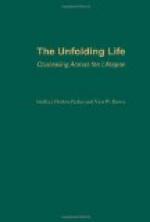But nurture will see that little hands are allowed to hinder by “helping” to make the beds, or dust the room or carry the package, not simply that love may grow stronger, but that in after years there may be the desire to lift the burdens in reality from wearied shoulders, for the higher feelings of life develop from the instinctive feelings, if they have proper expression in the beginning. Love that is almost barter in early years, since it is bestowed for value received, if given constant expression in acts of helpfulness, will become the self-denying love of later years. Love for self, which is so strong in a child, can be developed toward its manifestation of self respect, by using it at first in childhood, “to help this good body grow both strong and tall.” Childish hate may be directed against wrong things, in preparation for indignation against sin of future years. It must not be forgotten, however, that in God’s economy every feeling, if properly used, has its work to do in character building in every stage of its development, so that even the foundation stones may be laid in beauty and strength.
THE WILL
The power of the soul to make deliberate choice of action, and unwaveringly to execute it, is undeveloped in this period of Early Childhood. The child does not balance reasons or desires. Instead, he acts impetuously and unthinkingly, as the feeling of the passing moment impels him. Often one desire so completely absorbs his mind as to obscure everything else, and he will make any effort to gain his end. His case is like that of a man who “sets his heart” on a thing, or who harbors an alluring temptation too long, until it overpowers him. This is the explanation of most cases of obstinacy and strong will, as is proven by the disappearance of the “will” when the mind is diverted.
One of the deepest desires of every parent and teacher is that there shall in truth be a strong will as the life matures, and so its training is sought. But just what is meant by it? We know there is no separate faculty to be strengthened as the arm is strengthened. What can be trained? The only training possible is in helping the soul to form the habit of choosing to do the right thing, or, analyzing still more closely, of following the promptings of the noblest feelings of the heart.
The inseparable relation between feeling and action has been noted. If the noblest feelings can be made the strongest, they will be followed. The previous discussion shows that their strength is increased every time they are aroused and acted upon, and this leads to habit in both feeling and action. The nurture of the will or executive power of the soul is seen, therefore, to be most intimately connected with the nurture of the feelings, and its work will consist in making the right course of action so appealing that the child will desire and choose it for himself, until it becomes habitual, and consequently, undebatable. Forcing him to follow it, secures the action; it does not arouse the feelings that would lead him to choose to do the act himself.




